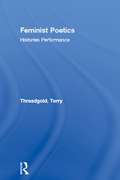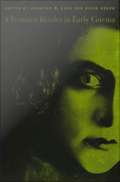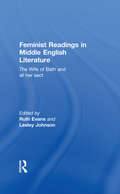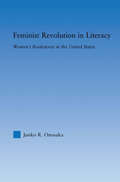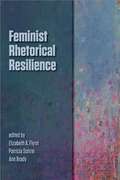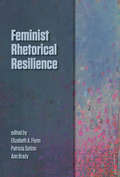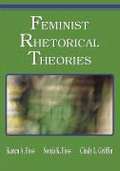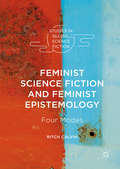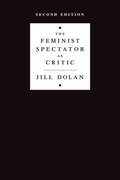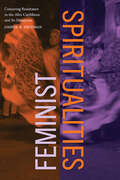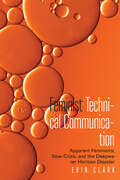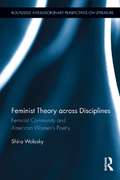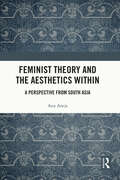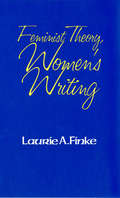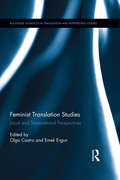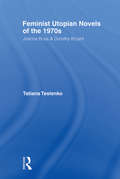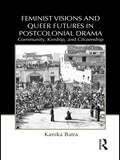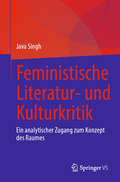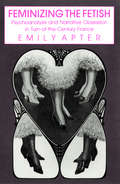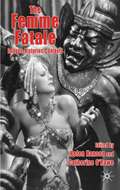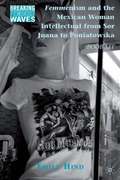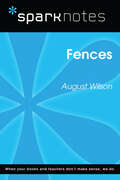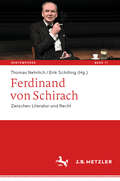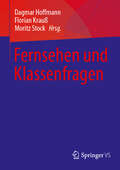- Table View
- List View
Feminist Poetics: Performance, Histories
by Terry ThreadgoldFeminist Poetics in concerned with all of these questions, but also with the issue of rewriting an older poetics for what it does not say about the marginalisation of the feminine. The first half of the book traces the trajectory of a particular, feminine, academic subject learning to find her voice. The second half uses that differently disciplined voice to re-read the textual traces of the Governor murder stories, murders committed against white women and children by black men in Australia in 1900. This book is a feminist poetics for those who are engaged in the teaching of literacies, and in the making of Knowledge about literacies.
A Feminist Reader in Early Cinema
by Jennifer M. Bean Diane NegraA Feminist Reader in Early Cinema marks a new era of feminist film scholarship. The twenty essays collected here demonstrate how feminist historiographies at once alter and enrich ongoing debates over visuality and identification, authorship, stardom, and nationalist ideologies in cinema and media studies. Drawing extensively on archival research, the collection yields startling accounts of women's multiple roles as early producers, directors, writers, stars, and viewers. It also engages urgent questions about cinema's capacity for presenting a stable visual field, often at the expense of racially, sexually, or class-marked bodies. While fostering new ways of thinking about film history, A Feminist Reader in Early Cinema illuminates the many questions that the concept of "early cinema" itself raises about the relation of gender to modernism, representation, and technologies of the body. The contributors bring a number of disciplinary frameworks to bear, including not only film studies but also postcolonial studies, dance scholarship, literary analysis, philosophies of the body, and theories regarding modernism and postmodernism. Reflecting the stimulating diversity of early cinematic styles, technologies, and narrative forms, essays address a range of topics--from the dangerous sexuality of the urban flneuse to the childlike femininity exemplified by Mary Pickford, from the Shanghai film industry to Italian diva films--looking along the way at birth-control sensation films, French crime serials, "war actualities," and the stylistic influence of art deco. Recurring throughout the volume is the protean figure of the New Woman, alternately garbed as childish tomboy, athletic star, enigmatic vamp, languid diva, working girl, kinetic flapper, and primitive exotic. Contributors. Constance Balides, Jennifer M. Bean, Kristine Butler, Mary Ann Doane, Lucy Fischer, Jane Gaines, Amelie Hastie, Sumiko Higashi, Lori Landay, Anne Morey, Diane Negra, Catherine Russell, Siobhan B. Somerville, Shelley Stamp, Gaylyn Studlar, Angela Dalle Vacche, Radha Vatsal, Kristen Whissel, Patricia White, Zhang Zhen
Feminist Readings in Middle English Literature: The Wife of Bath and All Her Sect
by Ruth Evans Lesley JohnsonThis volume, designed with the student reader in mind, is an indispensable blend of key essays in the field with specially commissioned new material by feminist scholars from the UK and the US. It includes a diversity of texts and feminist approaches, a substantial and very illuminating introduction by the editors, and an annotated list of Further Reading, offering preliminary guidance to the reader approaching the topic of gender and medieval literature for the first time. Works and writers covered include: * Chaucer * Margery Kempe * Christine de Pisan * The Katherine group of Saints' Lives * Langland's Piers Plowman * Medieval cycle drama Students of both medieval and feminist literature will find this an essential work for study and reference.
Feminist Revolution in Literacy: Women's Bookstores in the United States (Studies in American Popular History and Culture)
by Junko OnosakaThis book examines the history of women's bookstores in the US from the 1970s to the 1990s. It establishes that women's bookstores played an important role in feminism by enabling the dissemination of women's voices and thereby helping to sustain and enrich the women's movement. They improved women's literacy - their abilities to read, write, publish, and distribute women's voices and visions - and helped women to instigate a feminist revolution in literacy.
Feminist Rhetorical Resilience
by Ann Brady Elizabeth A Flynn Patricia SotirinAlthough it is well known in other fields, the concept of "resilience" has not been addressed explicitly by feminist rhetoricians. This collection develops it in readings of rhetorical situations across a range of social contexts and national cultures. Contributors demonstrate that resilience offers an important new conceptual frame for feminist rhetoric, with emphasis on agency, change, and hope in the daily lives of individuals or groups of individuals disempowered by social or material forces. Collectively, these chapters create a robust conception of resilience as a complex rhetorical process, redeeming it from its popular association with individual heroism through an important focus on relationality, community, and an ethics of connection. Resilience, in this volume, is a specifically rhetorical response to complicated forces in individual lives. Through it, Feminist Rhetorical Resilience widens the interpretive space within which rhetoricians can work.
Feminist Rhetorical Resilience
by Elizabeth A. Flynn, Patricia Sotirin and Ann BradyAlthough it is well known in other fields, the concept of “resilience” has not been addressed explicitly by feminist rhetoricians. This collection develops it in readings of rhetorical situations across a range of social contexts and national cultures. Contributors demonstrate that resilience offers an important new conceptual frame for feminist rhetoric, with emphasis on agency, change, and hope in the daily lives of individuals or groups of individuals disempowered by social or material forces. Collectively, these chapters create a robust conception of resilience as a complex rhetorical process, redeeming it from its popular association with individual heroism through an important focus on relationality, community, and an ethics of connection. Resilience, in this volume, is a specifically rhetorical response to complicated forces in individual lives. Through it, Feminist Rhetorical Resilience widens the interpretive space within which rhetoricians can work.
Feminist Rhetorical Theories
by Karen A. Foss Sonja K. Foss Cindy L. GriffinFeminist Rhetorical Theories offers feminist rhetorical theories developed from the works of nine feminist theorists who offer important insights into rhetoric and communication? Chris Kramarae, Bell Hooks, Gloria Anzaldua, Mary Daly, Starhawk, Paula Gunn Allen, Trinh T. Minh-ha, Sally Miller Gearhart, and Sonia Johnson. Each of the theories is explicated in terms of the nature of the world or the realm for rhetoric explicated by the theorist, the theorist's definition of feminism, the nature of the rhetor or the kind of agent the theorist sees as acting in the world, and the rhetorical options envisioned by the theorist as available to rhetors. The resulting theories of rhetoric, which are substantially different from traditional rhetorical theories, re-vision rhetoric and encourage scholars to rethink many traditional rhetorical constructs.
Feminist Science Fiction and Feminist Epistemology
by Ritch CalvinThis book argues that feminist science fiction shares the same concerns as feminist epistemology challenges to the sex of the knower, the valuation of the abstract over the concrete, the dismissal of the physical, the focus on rationality and reason, the devaluation of embodied knowledge, and the containment of (some) bodies. Ritch Calvin argues that feminist science fiction asks questions of epistemology because those questions are central to making claims of subjectivity and identity. Calvin reveals how women, who have historically been marginal to the deliberations of philosophy and science, have made significant contributions to the reconsideration and reformulation of the epistemological models of the world and the individuals in it. "
The Feminist Spectator as Critic (Second Edition)
by Jill DolanThe Feminist Spectator as Critic broke new ground as one of the pioneering books on feminist spectatorship, encouraging resistant readings to generate feminist meanings in performance. Approaching live spectatorship through a range of interdisciplinary methods, the book has been foundational in theater studies, performance studies, and gender/sexuality/women's studies. This updated and enlarged second edition celebrates the book's twenty-fifth anniversary with a substantial new introduction and up-to-the-moment bibliography, detailing the progress to date in gender equity in theater and the arts, and suggesting how far we have yet to go.
Feminist Spiritualities: Conjuring Resistance in the Afro-Caribbean and Its Diasporas (SUNY series, Afro-Latinx Futures)
by Joshua R. DeckmanFeminist Spiritualities aims to complicate contemporary debates surrounding Black/Latinx experiences within a critical framework of decolonial thought, women of color feminisms, politicized emotional structures, and anti-imperial politics. Joshua R. Deckman considers literary and cultural productions from Puerto Rico, the Dominican Republic, Haiti, Cuba, and their diasporas in the United States, exploring epistemic spaces that have historically been marked as irrational and inconsequential for the production of knowledge—including social media posts, song lyrics, public writings, speeches, and personal interviews. Analyzing works by Yolanda Arroyo Pizarro, Mayra Santos-Febres, Rita Indiana Hernández, Ana-Maurine Lara, Elizabeth Acevedo, María Teresa Fernández, Nitty Scott, Lxs Krudxs Cubensi, and Ibeyi, Deckman shows how these authors develop afro-epistemologies grounded in Caribbean feminist spiritualities and manifest a commitment to finding joy and love in difference. Literary, anthropological, and more, Feminist Spiritualities weaves through a series of fields and methodologies in an undisciplined way to contribute new close readings of recent works and fresh assessments of well-known ones.
Feminist Technical Communication: Apparent Feminisms, Slow Crisis, and the Deepwater Horizon Disaster
by Erin ClarkFeminist Technical Communication introduces readers to technical communication methodology, demonstrating how rhetorical feminist approaches are vital to the future of technical communication. Using an intersectional and transcultural approach, Erin Clark fuses the well-documented surge of work in feminist technical communication throughout the 1990s with the larger social justice turn in the discipline. The first book to situate feminisms and technical communication in relationship as the focal point, Feminist Technical Communication traces the thread of feminisms through technical communication’s connection to social justice studies. Clark theorizes “slow crisis,” a concept made readable to technical communicators by apparent feminisms that can help technical communicators readily recognize and address social justice problems. Clark then applies this framework to the Deepwater Horizon Disaster, an extended crisis that has been publicly framed by a traditional view of efficiency that privileges economic impact. Through rich description of apparent feminist information-gathering techniques and a layered analysis this study offers application far beyond this single disaster, making available new crisis-response possibilities that consider the economy without eliding ecological and human health concerns. Feminist Technical Communication offers a methodological approach to the systematic interrogation of power structures that operate on hidden misogynies. This book is useful to technical communicators, scholars of technical communication and rhetoric, and readers interested in gender studies and public health and is an ideal text for graduate-level seminars focused on feminisms, social justice, and cultural studies.
Feminist Theory Across Disciplines: Feminist Community and American Women's Poetry (Routledge Interdisciplinary Perspectives on Literature #17)
by Shira WoloskyDefying traditional definitions of public and private as gendered terms, and broadening discussion of women’s writing in relation to feminist work done in other fields, this study addresses American women’s poetry from the seventeenth to late-twentieth century. Engaging the fields of literary criticism, anthropology, psychology, history, political theory, religious culture, cultural studies, and poetics, this study provides entry into some of the founding feminist discussions across disciplines, moving beyond current scholarship to pursue an interpretation of feminism’s defining interests and assumptions in the context of women’s writing. The author emphasizes and explores how women’s writing expresses their active participation in community and civic life, emerging from and shaping a woman’s selfhood as constituted through relationships, not only on the personal level, but as forming community commitments. This distinctive formation of the self finds expression in women’s voices and other poetic forms of expression, with the aesthetic power of poetry itself bringing different arenas of human experience to bear on each other in mutual interrogation and reflection. Women poets have addressed the public world, directly or through a variety of poetic structures and figures, and in doing so they have defined and expressed specific forms of selfhood engaged in and committed to communal life.
Feminist Theory and the Aesthetics Within: A Perspective from South Asia
by Anu AnejaThis book re-examines feminist theory by looking at South Asian aesthetic conventions drawn from iconography, philosophy, Indo-Islamic mystic folk traditions and poetics. It discusses alternate fluid representations of gender and intersectional identities and interrelationships in some dominant as well as non-elite Indic aesthetic traditions. The book explores pre-Vedic sculptural and Indus terracotta iconographies; the classical aesthetic philosophy of rasa; mystic folk poetry of Bhakti and Sufi movements, and ghazal and Urdu poetics, to understand the political dimension of feminist theory in India as well as its implications for trans-continental feminist aesthetics across South Asia and the west. By interlinking pre-historic, classical, medieval, pre-modern and contemporary aesthetic and literary traditions of South Asia through a gendered perspective, the book bridges a major gap in feminist theory. An interdisciplinary work, this book will be useful for scholars and researchers of feminist theory, women’s studies, gender studies, art and aesthetics, philosophy, literature, cultural studies, queer studies, sexuality studies, political studies, sociology and South Asian studies.
Feminist Theory, Women's Writing (Reading Women Writing)
by Laurie A. FinkeIn this rewarding book, Laurie A. Finke challenges assumptions about gender, the self, and the text which underlie fundamental constructs of contemporary feminist theory. She maintains that some of the key concepts structuring feminist literary criticism need to be reexamined within both their historical context and the larger framework of current theory concerning language, representation, subjectivity, and value.
Feminist Translation Studies: Local and Transnational Perspectives (Routledge Advances in Translation and Interpreting Studies)
by Olga Castro Emek ErgunFeminist Translation Studies: Local and Transnational Perspectives situates feminist translation as political activism. Chapters highlight the multiple agendas and visions of feminist translation and the different political voices and cultural heritages through which it speaks across times and places, addressing the question of how both literary and nonliterary discourses migrate and contribute to local and transnational processes of feminist knowledge building and political activism. This collection does not pursue a narrow, fixed definition of feminism that is based solely on (Eurocentric or West-centric) gender politics—rather, Feminist Translation Studies: Local and Transnational Perspectives seeks to expand our understanding of feminist action not only to include feminist translation as resistance against multiple forms of domination, but also to rethink feminist translation through feminist theories and practices developed in different geohistorical and disciplinary contexts. In so doing, the collection expands the geopolitical, sociocultural and historical scope of the field from different disciplinary perspectives, pointing towards a more transnational, interdisciplinary and overtly political conceptualization of translation studies.
Feminist Utopian Novels of the 1970s: Joanna Russ and Dorothy Bryant
by Tatiana TeslenkoThis book presents an exploration of the reinvented utopia that provided second-wave feminists of the 1970s with a conceptual space to articulate the politics of change. Tatiana Teslenko argues that utopian fiction of this decade offered a means of validating the personal as well as the political, and of criticizing a patriarchal social order. Tesl
Feminist Visions and Queer Futures in Postcolonial Drama: Community, Kinship, and Citizenship (Routledge Advances In Theatre And Performance Studies #17)
by Kanika BatraIn this timely study, Batra examines contemporary drama from India, Jamaica, and Nigeria in conjunction with feminist and incipient queer movements in these countries. Postcolonial drama, Batra contends, furthers the struggle for gender justice in both these movements by contesting the idea of the heterosexual, middle class, wage-earning male as the model citizen and by suggesting alternative conceptions of citizenship premised on working-class sexual identities. Further, Batra considers the possibility of Indian, Jamaican, and Nigerian drama generating a discourse on a rights-bearing conception of citizenship that derives from representations of non-biological, non-generational forms of kinship. Her study is one of the first to examine the ways in which postcolonial dramatists are creating the possibility of a dialogue between cultural activism, women’s movements, and an emerging discourse on queer sexualities.
Feministische Literatur- und Kulturkritik: Ein analytischer Zugang zum Konzept des Raumes
by Java SinghFeministische Literatur- und Kulturkritik erforscht interdisziplinäre Verbindungen zwischen Kulturanthropologie, Geographie, Psychologie und feministischer Literaturkritik, um einen theoretischen Rahmen für Raumkritik zu entwickeln. Anhand des im Buch entwickelten Rahmens der räumlichen Gynokritik werden ausgewählte Texte aus fünf verschiedenen Genres - Kurzgeschichte, Roman, Film, Zeichentrickfilm und OTT-Serie - analysiert, die von Frauen verfasst wurden. Die in dem Buch behandelten Autorinnen bilden eine transnationale Gemeinschaft von Frauen, die gemeinsame Anliegen in Bezug auf Geschlecht, Umwelt, Technologie und soziale Hierarchien teilen. Es handelt sich um eine geografisch und sprachlich vielfältige Gruppe aus Indien, Uruguay, Spanien, Argentinien und den USA. Das Buch bietet ein immenses Potenzial für eine vergleichende Studie zu zahlreichen Aspekten, von denen sich die vorliegende Arbeit auf die Behandlung des Themas Raum konzentriert und zeigt, dass räumliche Logik undGrammatik wesentliche Elemente der feministischen Praxis sind. Das Buch offenbart das ungeprüfte Potenzial der Praxis der Schöpferinnen, die zugeschriebenen Zentren, um die herum die sozialen Arrangements strukturiert sind, zu destabilisieren, zu dezentrieren und zu zerstören. Darüber hinaus bietet das Buch wertvolle Analyseinstrumente, die die Literaturtheorie, die vergleichenden Kulturwissenschaften, die vergleichende Literaturwissenschaft, die Geschlechterforschung, die feministische Kritik und die interdisziplinären Geisteswissenschaften bereichern. Es ist ein unverzichtbares Hilfsmittel für Studierende und Lehrende in diesen Studienbereichen, das es ihnen ermöglicht, Texte aus einer neuen Perspektive zu betrachten.
Feminizing the Fetish: Psychoanalysis and Narrative Obsession in Turn-of-the Century France
by Emily ApterShoes, gloves, umbrellas, cigars that are not just objects—the topic of fetishism seems both bizarre and inevitable. In this venturesome and provocative book, Emily Apter offers a fresh account of the complex relationship between representation and sexual obsession in turn-of-the-century French culture. Analyzing works by authors in the naturalist and realist traditions as well as making use of documents from a contemporary medical archive, she considers fetishism as a cultural artifact and as a subgenre of realist fiction. Apter traces the web of connections among fin-de-siècle representations of perversion, the fiction of pathology, and the literary case history. She explores in particular the theme of "female fetishism" in the context of the feminine culture of mourning, collecting, and dressing.
The Femme Fatale: Images, Histories, Contexts
by Helen Hanson Catherine O’raweThese essays trace the femme fatale across literature, visual culture and cinema, exploring the ways in which fatal femininity has been imagined in different cultural contexts and historical epochs, and moving from mythical women such as Eve, Medusa and the Sirens via historical figures such as Mata Hari to fatal women in contemporary cinema.
Femmenism and the Mexican woman intellectual from Sor Juana to Poniatowska: Boob Lit
by Emily HindHind draws on poetry, short stories, plays, novels, photographs, personal correspondence, advertising, and interviews to make visible the anti-feminine tendencies in femmenism and to imagine a femmenism that will appeal to the next generation of women.
Fences (SparkNotes Literature Guide Series)
by SparkNotesFences (SparkNotes Literature Guide) by August Wilson Making the reading experience fun! Created by Harvard students for students everywhere, SparkNotes is a new breed of study guide: smarter, better, faster.Geared to what today's students need to know, SparkNotes provides:*chapter-by-chapter analysis *explanations of key themes, motifs, and symbols *a review quiz and essay topics Lively and accessible, these guides are perfect for late-night studying and writing papers.
Ferdinand von Schirach: Zwischen Literatur und Recht (Kontemporär. Schriften zur deutschsprachigen Gegenwartsliteratur #17)
by Erik Schilling Thomas NehrlichFerdinand von Schirach war lange Strafverteidiger, bevor er mit dem Erzählband Verbrechen einen sensationellen Debüterfolg feierte. Seither hat er ein umfangreiches und vielfältiges literarisches Werk veröffentlicht. Mit über 10 Millionen verkauften Büchern und Übersetzungen in über 40 Ländern gehört Schirach zu den meistgelesenen deutschen Gegenwartsautoren. Wie erklärt sich dieser Erfolg? Was zeichnet seine Texte aus, ästhetisch, diskursiv und politisch? Die im vorliegenden Band versammelten Beiträge untersuchen Schirachs Werk aus literatur-, kultur- und rechtswissenschaftlicher Perspektive: seine Poetik, seine Medien und vor allem seine Verbindung von Literatur und Recht.
Fernsehen und Klassenfragen
by Dagmar Hoffmann Florian Krauß Moritz StockDer Sammelband untersucht das Verhältnis von Klasse – einer nicht nur ökonomischen, sondern auch kulturellen und politischen Kategorie – und dem Fernsehen in seinen gegenwärtigen hybriden Formen vor allem aus vier Perspektiven: Erstens geht es um Klassenfragen im Fernsehen, auf der Ebene der Repräsentation, zweitens um Klassenfragen des Fernsehens auf der Seite der Produktion. Hier ist zum Beispiel zu analysieren, welche Klassen welches Fernsehen (für welche Klassen) entwickelt und herstellt. Unter drittens Klassenfragen beim Fernsehen fallen Beiträge, die sich auf die Seite der Rezeption fokussieren und zum Beispiel die Lesarten zu spezifischen Klassendarstellungen beleuchten. Viertens nimmt der Band Klassenfragen der Fernsehwissenschaft in den Blick und reflektiert in diesem Zusammenhang ihre Lücken und ihre Prägung durch Klassenzugehörigkeit.
